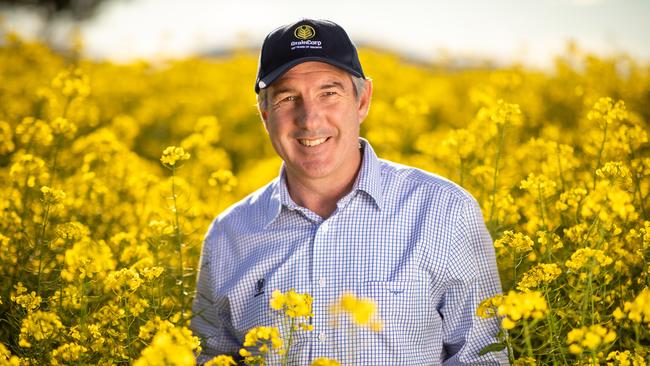GrainCorp CEO Robert Spurway sees risk and reward in US transition
Robert Spurway says protectionist policies could disrupt global supply chains, but efforts to streamline US regulations might create opportunities for more efficient trade.

Economy
How would you rate the momentum of the Australian economy as we head into 2025? Official forecasts have Australia trimming interest rates from the first half of calendar 2025, is that consistent with your view? What are you seeing around inflation in your own business?
With slowing growth, persistent inflation and poor productivity, it’s a challenging time for the Australian economy.
It’s difficult for anyone to put their finger on interest rate movements – you could offer a prediction based on current data but given the unpredictable environment of global market shifts, inflation trends and employment data, it would just be an educated guess. Government and businesses alike need to focus on policy that will improve productivity and lift private sector investment instead.
The Australian grains industry is navigating inflationary pressures by focusing on innovation and efficiency. GrainCorp’s resilience stems from our ability to operate in markets where commodity prices naturally adjust to reflect inflationary pressures. We maintain a sharp focus on cost management, ensuring stability through the fluctuations of crop cycles.
While rising input costs – from fuel to fertilisers – have challenged profitability for farmers and must not be ignored, the agriculture sector is demonstrating its characteristic adaptability, finding innovative ways to navigate some of these pressures.
Farmers and agribusinesses are leveraging precision agriculture technologies to optimise yields and reduce waste, while businesses like GrainCorp are working to enhance supply chain efficiencies and sustainable practices. Our drive to diversify end markets and invest in value-added processing have also helped to create more stable revenue streams through the years.
Outlook
What excites you heading into 2025? Are you likely to increase, hold steady, or trim your investment spend?
GrainCorp has a strong balance sheet that provides flexibility to invest in the business and pursue growth, as well as providing strong returns to shareholders. It’s a great position to be in as we head into 2025.
Reform
As we move into an election year, in your mind, what’s the single biggest lever that can/should be used to lift Australia’s competitiveness or productivity? This could be across any area from labour market, tax reform, training or other areas to encourage investment.
Productivity remains the most critical driver of Australia’s economic prosperity and a key focus for the year ahead. In an environment of rising costs, global competition, and tightening fiscal conditions, improving productivity across industries including agriculture, is essential for sustaining growth, creating jobs, and ensuring long-term economic resilience.
We must prioritise policies that enable businesses to streamline operations and invest in the skills and tools necessary to achieve greater efficiency. This includes fostering a regulatory environment that encourages investment in advanced technologies, infrastructure, and research and development, particularly in sectors like agriculture, resources, and manufacturing.
Governments and businesses must also work together to embed our sustainability goals into productivity improvements. Energy efficiency, circular economy practices, and other innovations that align economic growth with environmental stewardship will help ensure Australia remains competitive in a world increasingly focused on climate action.
GrainCorp and partners are consulting with the Australian Government on the appropriate policy settings for a renewable fuels supply chain in Australia – this is the perfect example of where policy must meet industry halfway to stand up sustainable, innovative practices that bolster our national productivity.
Geopolitics
Will a Donald Trump presidency have a potential impact on your business or sector (tariffs or streamlined regulation)? Does geopolitics drive a bigger part of your decision-making?
Global food supply and demand are finely balanced, and the fundamental drivers of GrainCorp’s business remain robust, as people always need to eat. While evolving US policies may shape the trading landscape, GrainCorp, along with the rest of Australia, benefits from the rules-based trading system. We remain committed to supporting the Australian government in advocating for free and fair trade practices that underpin global stability.
Shifts toward protectionist policies or changes in tariffs could disrupt global supply chains and trade flows, affecting the export and import dynamics that are crucial to our operations at GrainCorp. On the other hand, efforts to streamline regulations in the US might create opportunities for more efficient trade, especially in commodities or goods where the US is a key market or partner.
Global events, trade agreements and geopolitical tensions can influence everything from market access to currency fluctuations, which are significant factors in our sector. We continuously monitor these developments and work to diversify our markets and strengthen relationships with key trading partners to mitigate risks.
People
Has your organisation’s approach to flexible working – including working from home – evolved during the year. Is this likely to change further into 2025?
Like many other Australian companies, up to 80 per cent of GrainCorp’s employees work in operational roles requiring attendance at a port, site or processing facility. We’re committed to maintaining flexibility in our working arrangements, while noting that differences throughout our business – from operational roles to corporate roles – require different approaches.
Technology
Where is your organisation along the AI journey – is it in the developmental stage, or are you now using the technology at scale across your business? If so, are benefits matching the promise?
For the past two years, GrainCorp has invested into AI which is now led by a dedicated team. The team is focused on deploying innovative AI solutions at scale across the organisation, improving existing processes and securing commercial returns. One example is the team’s collaboration with our Grains business to optimise pre-harvest planning across our network, providing us with a more accurate picture of what to expect at the busiest time of year, and therefore provide a more efficient service for growers and customers.



To join the conversation, please log in. Don't have an account? Register
Join the conversation, you are commenting as Logout